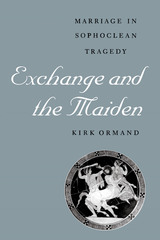
Marriage is a central concern in five of the seven extant plays of the Greek tragedian Sophocles. In this pathfinding study, Kirk Ormand delves into the ways in which these plays represent and problematize marriage, thus offering insights into how Athenians thought about the institution of marriage.
Ormand takes a two-fold approach. He first explores the legal and economic underpinnings of Athenian marriage, an institution designed to guarantee the legitimate continuation of patrilineal households. He then shows how Sophocles' plays Trachiniae, Electra, Antigone, Ajax, and Oedipus Tyrannus both reinforce and critique this ideology by representing marriage as a homosocial exchange between men, in which women are objects who may attempt—but always fail—to become self-acting subjects.
These fresh readings provide the first systematic study of marriage in Sophocles. They draw important connections between drama and marriage as rituals concerned with controlling potentially disruptive female subjectivities.
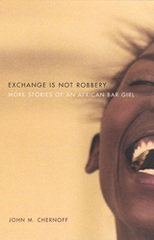
In Exchange Is Not Robbery and its predecessor, Hustling Is Not Stealing, a chronicle of exploitation is transformed by verbal art into an ebullient comedy. In Hustling Is Not Stealing, Hawa is a playful warrior struggling against circumstances in Ghana and Togo. In Exchange Is Not Robbery, Hawa returns to her native Burkina Faso, where she achieves greater control over her life but faces new difficulties. As a woman making sacrifices to live independently, Hawa sees her own situation become more complex as she confronts an atmosphere in Burkina Faso that is in some ways more challenging than the one she left behind, and the moral ambiguities of her life begin to intensify.
Combining elements of folklore and memoir, Hawa's stories portray the diverse social landscape of West Africa. Individually the anecdotes can be funny, shocking, or poignant; assembled together they offer a sweeping critical and satirical vision.
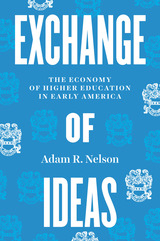
Exchange of Ideas launches a breathtakingly ambitious new economic history of American higher education. In this volume, Adam R. Nelson focuses on the early republic, explaining how knowledge itself became a commodity, as useful ideas became salable goods and American colleges were drawn into transatlantic commercial relations. American scholars might once have imagined that higher education could sit beyond the sphere of market activity—that intellectual exchange could transcend vulgar consumerism—but already by the end of the eighteenth century, they saw how ideas could be factored into the nation’s balance of trade. Moreover, they concluded that it was the function of colleges to oversee the complex process whereby knowledge could be priced and purchased. The history of capitalism and the history of higher education, Nelson reveals, are intimately intertwined—which raises a host of important and strikingly urgent questions. How do we understand knowledge and education as commercial goods? Who should pay for them? And, fundamentally, what is the optimal system of higher education in a capitalist democracy?
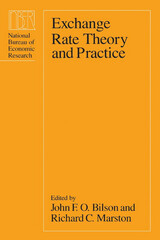
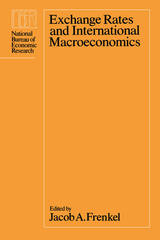
Both empirical and theoretical research are represented, and the contributors analyze such issues as the performance of various models of exchange rate determination, the role of risk and speculation in the forward market for foreign exchange, the rational expectations hypothesis in such markets, the performance of monetary policy in ten industrial countries, the role that labor market contracts play in exchange rate policies, the effect of he oil shocks on the evolution of exchange rates, and the output cost of bringing down inflation in the open economy.
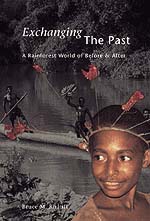
In this book, Knauft explores the Gebusi's encounter with modern institutions and highlights what their experience tells us more generally about the interaction between local peoples and global forces. As desire for material goods grew among Gebusi, Knauft shows that they became more accepting of and subordinated by Christian churches, community schools,and government officials in their attempt to benefit from them—a process Knauft terms "recessive agency." But the Gebusi also respond actively to modernity, creating new forms of feasting, performance, and music that meld traditional practices with Western ones, all of which Knauft documents in this fascinating study.

What can teachers in British and American inner-city schools learn from each other about literacy training? To explore this question, Sarah Warshauer Freedman and her British colleagues set up a writing exchange that matched classes from four middle and high schools in the San Francisco Bay area with their London equivalents.
Exchanging Writing, Exchanging Cultures offers concrete lessons to school reformers, policymakers, and classroom teachers about the value and effectiveness of different approaches to teaching writing. Freedman goes beyond the specific subject matter of this study, looking anew at Vygotsky's and Bakhtin's theories of social interaction and addressing the larger questions of the relationship between culture and education.


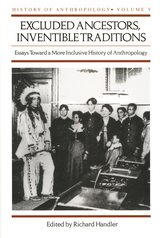
Excluded Ancestors, Inventible Traditions focuses on little-known scholars who contributed to the anthropological work of their time, such as John William Jackson, the members of the Hampton Folk-Lore Society, Charlotte Gower Chapman, and Lucie Varga. In addition, essays on Marius Barbeau and Sol Tax present figures who were centrally located in the anthropologies of their day. A final essay analyzes notions of "the canon" and considers the place of a classic ethnographic area, highland New Guinea, in anthropological canon-formation.

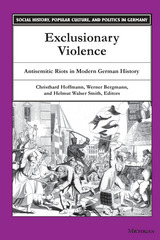
In the Western mind, outbursts of collective violence against Jews have been largely identified with Tzarist Russia and the medieval crusade massacres. However, by narrating pogroms as archaic, historians have overlooked their significance to the development of modern antisemitism in Germany and Europe as well as the reasons for its continued presence in the contemporary world. The evidence presented in this volume suggests that acts of exclusionary violence were not dead-end streets of futile protest. Rather, they were rehearsals for new kinds of destruction.
The integration of various perspectives and the close cooperation of scholars from different disciplines is a major achievement of this volume, which will be of interest to advanced undergraduates, graduate students, academics and the general reader in a variety of disciplines, including German studies, Jewish studies, Holocaust and genocide studies, ethnic relations, history, and the social sciences in general.
Christhard Hoffmann is Associate Professor of Modern European History, University of Bergen, Norway. Werner Bergmann is Professor of Research on Antisemitism, Technical University, Berlin, Germany. Helmut W. Smith is Associate Professor of History, Vanderbilt University.


In the mid-1800s, Judson argues, German liberal activists built an effective political movement whose ideology was rooted in its members' social experience in voluntary associations. The liberals were committed to the creation of a market economy based on personal property rights, to a society based on the values of individual self-improvement and personal respectability, and to a fundamental distinction between active and passive citizenship. They were determined to achieve a harmonious community of free peoples, in which personal enlightenment would bring an end to the divisive influence of localism, ethnicity, religion, and feudal social hierarchy.
Yet after 1880, as newer, more radical mass political movements threatened their political fortunes, the liberals forged a German nationalist politics based increasingly on ethnic identity. Their emphasis on national identity became a way for former liberals to hold together an increasingly diverse coalition of German speakers who had little in common outside of their shared language. Only "Germanness" bridged the dangerous gulf between social classes. This nationalism helped the liberals to compete for power in the multinational, multicultural Austrian Empire down to 1914, but it left a legacy of nationalist extremism and tolerance of anti-Semitism that continues to influence political cultures in the former lands of the Habsburg Monarchy today.
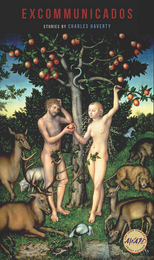
A sixteen-year-old boy unearths grisly evidence of his genteel grandfather’s racist past. At his sister’s booze-soaked destination wedding, a recovering alcoholic English professor is finagled into ghostwriting their unreliable father’s nuptial toast. A small town lawyer’s Edenic existence is jeopardized when his wife’s younger brother is arrested for a rash of local burglaries. In the wake of her daughter’s brush with disaster in the Haiti earthquake, a mother finds herself drawn down a dark neighborhood sidewalk toward what might or might not be a dead body. And in the title story—the first of three linked stories—a pious altar boy confronts the twin mysteries of sex and death through the auspices of a classmate’s divorced mother.
There are secrets at the center of each of these daring and original stories—secrets that separate these characters from one another but grow in the mind and the heart, connecting them with all of us.
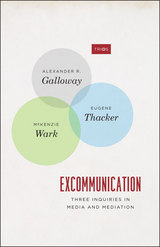

Focusing on the struggles and quandaries of everyday life, Jackson touches on matters at the core of anthropology—the state, violence, exile and belonging, labor, indigenous rights, narrative, power, home, and history. He is particularly interested in the gaps that characterize human existence, such as those between insularity and openness, between the things over which we have some control and the things over which we have none, and between ourselves and others as we talk past each other, missing each others’ meanings. Urging a recognition of the limits to which human existence can be explained in terms of cause and effect, he suggests that knowing why things happen may ultimately be less important than trying to understand how people endure in the face of hardship.

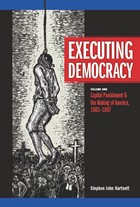
Executing Democracy: Capital Punishment & the Making of America, 1683-1807 is the first volume of a rhetorical history of public debates about crime, violence, and capital punishment in America. This examination begins in 1683, when William Penn first struggled to govern the rowdy indentured servants of Philadelphia, and continues up until 1807, when the Federalists sought to impose law-and-order upon the New Republic.
This volume offers a lively historical overview of how crime, violence, and capital punishment influenced the settling of the New World, the American Revolution, and the frantic post-war political scrambling to establish norms that would govern the new republic.
By presenting a macro-historical overview, and by filling the arguments with voices from different political camps and communicative genres, Hartnett provides readers with fresh perspectives for understanding the centrality of public debates about capital punishment to the history of American democracy.
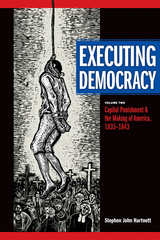
This eye-opening and well-researched companion to the first volume of Executing Democracy enters the death-penalty discussion during the debates of 1835 and 1843, when pro-death penalty Calvinist minister George Barrell Cheever faced off against abolitionist magazine editor John O’Sullivan. In contrast to the macro-historical overview presented in volume 1, volume 2 provides micro-historical case studies, using these debates as springboards into the discussion of the death penalty in America at large. Incorporating a wide range of sources, including political poems, newspaper editorials, and warring manifestos, this second volume highlights a variety of perspectives, thus demonstrating the centrality of public debates about crime, violence, and punishment to the history of American democracy. Hartnett’s insightful assessment bears witness to a complex national discussion about the political, metaphysical, and cultural significance of the death penalty.
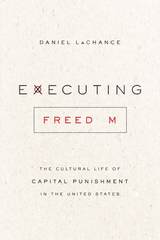
That question is at the heart of Executing Freedom, a powerful, wide-ranging examination of the place of the death penalty in American culture and how it has changed over the years. Drawing on an array of sources, including congressional hearings and campaign speeches, true crime classics like In Cold Blood, and films like Dead Man Walking, Daniel LaChance shows how attitudes toward the death penalty have reflected broader shifts in Americans’ thinking about the relationship between the individual and the state. Emerging from the height of 1970s disillusion, the simplicity and moral power of the death penalty became a potent symbol for many Americans of what government could do—and LaChance argues, fascinatingly, that it’s the very failure of capital punishment to live up to that mythology that could prove its eventual undoing in the United States.

Seventy-Five Years Ago, the Last American Soldier Who Paid the Ultimate Price for Desertion
A New Edition of the Acclaimed Investigative Story
In August 1944, a drab convoy of raw recruits destined to join the 28th Division lumbered along a windy French road strewn with dead animals, shattered bodies, and burning equipment. One of those draftees was 24-year-old Eddie Slovik, a petty thief from Detroit who had spent his youth in and out of reform schools. Eddie's luck had recently changed, however, with a steady factory job and marriage to a beautiful girl who gave Eddie hope and security for the first time in his life. But their honeymoon—like that of many other wartime newlyweds—was interrupted by the call to service. The convoy came under intense artillery fire, and in the confusion Slovik became separated from his unit. He joined a Canadian outfit and traveled with them before finally reporting to the 28th Division. He carried a rifle but no ammunition. He was assigned to a platoon but walked away. Refusing to kill, Slovik was arrested, court martialed, and condemned to death. Hundreds of soldiers were tried for desertion during World War II and sentenced to die, but only Eddie Slovik paid the price, supposedly as a deterrent, yet word of the nature of his death was never officially released to the public.
In The Execution of Private Slovik, considered to be among the best investigative books ever written, journalist and author William Bradford Huie reconstructs this entire story with the full cooperation of the U.S. Army in order to find out what made Eddie Slovik an unlikely pacifist and why the affair was covered up. Through interviews with those who knew him and the hundreds of letters to his wife, the author reveals a hard luck depression-era kid who when faced with the reality of war realized that he simply could not kill another human being. Throughout, Huie reveals how Eddie Slovik's death has much to tell us about life and duty to one's country. This edition marking the seventy-fifth anniversary of the sentence being carried out, contains a new introduction by the author's daughter.
Praise for The Execution of Private Slovik:
"In the hands of an expert, who writes both passionately and with an almost transparent effort to be fair to all concerned, the story raises questions to which our wisest leaders still lack satisfying answers."
—New York Times
"A remarkable story reported by a master."—W. E. B. Griffin
"Recommended reading for all military historians."—Military Affairs
"Tremendously moving."—The Atlantic
"It is very likely that William Bradford Huie's The Execution of Private Slovikwill long survive the official histories of World War II. It is a big book and Mr. Huie deserves some sort of rich reward for this unburying of an incident of the war which must disturb us all. For Slovik was more than a 'coward.' He not only did not want to die but he did not want to kill, and one must look far in literature for a figure so moving as Private Slovik wandering about Europe not with bullets in his cartridge belt but with writing paper. The question is not 'How might we improve military procedures?' The question is, 'What has happened to love in our world when he who would rather love than kill must die?'"—from a letter to the New York Times
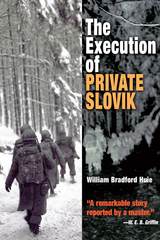

Executives today encounter social, psychological, and technical problems undreamed of by their predecessors. To help meet these challenges, Harry Levinson has written a thorough and timely revision of his acknowledged classic, The Exceptional Executive.
In Executive the author has added new material emphasizing the need for executive flexibility the ability to work with multiple constituencies, to mitigate tensions between middle and top management, to comprehend the social context within which business operates and to understand the needs of women and minorities. He has also added fourteen case studies that illuminate these major themes and problems.

A quiet revolution came to corporate America during the late 1980s and early 1990s. Large shareholders—pension funds, insurance companies, money manages, and commercial banks—exercised new-found muscle, pressuring senior managers to improve disappointing financial results by reshaping their organization. Michael Useem reveals how those investor pressures have transformed the inside structures of many corporations, better aligning them with shareholder interest.
Useem draws on numerous sources, including interviews with senior managers and intensive studies of seven large corporations representing a range of restructuring experiences and industries—including pharmaceuticals, transportation, chemicals, retailing, electronics, and financial services. He shows that organizational changes have affected many areas of corporate life: headquarters staffs have been reduced authority has filtered down to operating units, and compensation has become more closely tied to performance. Change also extends to corporate governance, where managers have fought back by seeking legal safeguards against takeovers and by staggering board terms. They’ve also put significant resources into building more effective relations with shareholders.
As Useem demonstrates, this revolution has reached beyond the corporation, influencing American politics and law. As increasing ownership concentration has caused companies to focus more attention on shareholders, corporate political agendas have shifted from fighting government regulation to resisting shareholder intrusion.
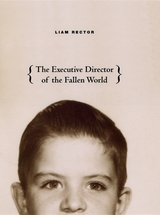
The Worry of the Far Right
The Reverend Donald Wildmon, executive director
Of the American Family Association in Tupelo,
Mississippi, birthplace of Elvis Presley, he who
Unleashed the libido of a generation, announced today
That he, the Reverend, wanted again an America
In which he could drive his convertible into town,
Park it, leave his keys in the ignition,
And worry only that it might rain,
Rather than worry about Liam Rector.
America—you are on notice. Liam Rector has little patience for “sincere” poetry, spin-doctored politicos, or moral hot air of any kind. The titles of these poems could easily serve as their own warning labels: those with clinical depression or easily triggered violent tendencies should use with caution.
The Executive Director of the Fallen World is fearless and forthright, just the sort of blunt reality check that is missing from so much of contemporary, over-stylized poetry. Rector’s stoicism and slightly murderous sense of humor pervade these poems as he doffs his hat to humility and audacity, taking on America, money, movement, marriages, and general cultural mayhem. The characters and voices in Rector’s poems are, by tragic turns, unflinching, clearly and cleanly bitter, sarcastically East Coast, and lyrical. Writing in tercets throughout, the poet breathes new life into this classic form with skill that might just send some unsuspecting readers over the edge.
As the former executive director of the Association of Writers and Writing Programs and a spirited First Amendment advocate who has sparred on screen with Bill O’Reilly, Liam Rector knows whereof he speaks in The Executive Director of the Fallen World.

Eighteen distinguished scholars and practicing officials address the problems of executive leadership in the United States, Britain, Canada, and Australia. Individual essays focus on cabinet government; domestic, military, and economic advisers; executive agencies; and personal staff for presidents and prime ministers. Provocative comparisons between and among systems make the discussions particularly insightful.

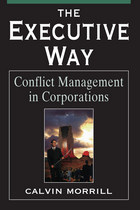
Personal and corporate scandals, compensation battles, budget worries, interdepartmental rivalries, personal enmities, and general rancor are among everyday challenges faced by executives. Morrill shows what most influences the way managers handle routine conflicts are the cultures created by their company's organizational structure: whether there is a strong hierarchy, a weak hierarchy, or an absence of any strong central authority. The issues most likely to cause conflict within corporations Morrill identifies as managerial style, competition between departments, and performance evaluations, promotions, and compensation.
Among the people whose day-to-day lives we get to know are Jacobs, a divisional executive whose intuitive understanding of the corporate hierarchy enables him to topple his incompetent superior without direct confrontation; Fuller, who through a mix of brains, guile, and connections rises from staff executive secretary to corporate vice president in a large bank; Green, an old-fashioned accounting partner in a firm being taken over by management consultants; and the "Princess of Power," "Iron Man," and the "Terminator"—executives fighting their way to the top of a successful entertainment company.
Unprecedented in its direct access to top managers, this portrayal of daily life and conflict management among corporate elites will be of interest to professionals, scholars, and practitioners in organizational culture and behavior, managerial decision making, dispute, social control, law and society, and organizational ethnography.
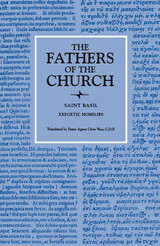
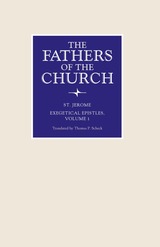

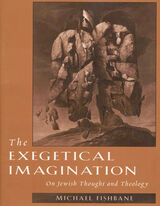
Exegesis--interpretation and explanation of sacred texts--is the quintessence of rabbinic thought. Through such means and methods, the written words of Hebrew Scripture have been extended since antiquity, and given new voices for new times. In this lucid and often poetic book, Michael Fishbane delineates the connections between biblical interpretation and Jewish religious thought.
How can a canon be open to new meanings, given that it is believed to be immutable? Fishbane discusses the nature and rationale of this interpretative process in a series of studies on ancient Jewish speculative theology. Focusing on questions often pondered in Midrash, he shows how religious ideas are generated or justified by exegesis. He also explores the role exegesis plays in liturgy and ritual. A striking example is the transfer of speculative interpretations into meditation in prayer. Cultivation of the ability to perceive many implicit meanings in a text or religious practice can become a way of living--as Fishbane shows in explaining how such notions as joy or spiritual meditations on death can be idealized and the ideal transmitted through theological interpretation. The Exegetical Imagination is a collection of interrelated essays that together offer new and profound understanding of scriptural interpretation and its central role in Judaism.

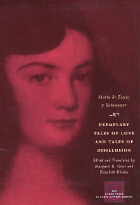
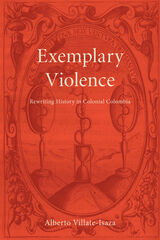
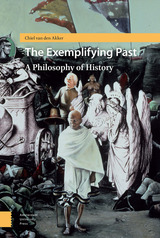

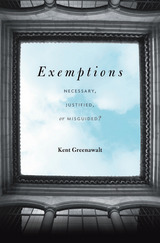
Should laws apply equally to everyone, or should some individuals and organizations be granted exemptions because of conflicting religious or moral convictions? In recent years, this question has become intensely controversial in America. The Supreme Court’s ruling on same-sex marriage, in particular, has provoked barbed debates about legal exemptions. At the core of these debates lies the question of whether basic values of equality and nondiscrimination are at odds with the right to live according to one’s religious beliefs.
In Exemptions: Necessary, Justified, or Misguided? Kent Greenawalt draws on his extensive expertise to place same-sex marriage and other controversies within a broader context. Avoiding oversimplification and reflecting a balanced consideration of competing claims and harms, he offers a useful overview of various types of exemptions and the factors that we should take into account when determining the justice of a particular exemption.
Through a close study of several cases, from doctors who will not perform abortions to institutions that do not pay taxes, Greenawalt demonstrates how to weigh competing values without losing sight of practical considerations like the difficulty of implementing a specific law. This thoughtful guide to exemptions will prove an invaluable resource as America struggles to come to terms with Obergefell v. Hodges, Burwell v. Hobby Lobby, and similar controversies. Exemptions shows how to reach the most just and desirable legal conclusions by respecting those who wish to live according to different fundamental values.
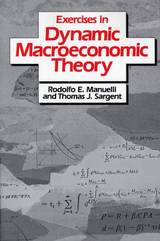
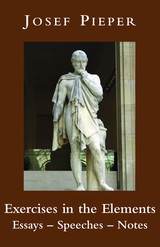
A fundamental issue for Pieper is “createdness.” He sees this as the fundamental truth of our being – all being – and the fundamental virtue we can practise is the striving to live according to our perception of real truth in any given situation.
The strength and attraction of Pieper’s writing is its direct and intuitive character which is independent of abstract systematization. He advocates staying in touch with the “real” as we experience it deep within ourselves. Openness to the totality of being – in no matter what context being reveals itself – and the affirmation of all that is founded in this totality are central pillars of all his thinking. Given the “simplicity” of this stance, it is no surprise that much of it is communicated – and successfully – through his gift for illustration by anecdote. Like Plato, this philosopher is a story-teller and, like him, very readable.

Life in a provincial capital is the subject of this study of Exeter during the Elizabethan and early Stuart ages. The author offers new insight into the way the English middle-class lived and the way in which Tudor policy achieved its aims in the provinces. During this period, Exeter was characterized by its self-sufficiency and by an oligarchical control over every aspect of its civic life. Wallace MacCaffrey describes a semi-autonomous world in itself, in which a small interlocked group of merchant families, related by marriage, kept tight control over the economy, politics, religion, education and social activities.
Taking the inclinations and actions of the local figures as his points of departure, the author discusses such great issues of the age as the Reformation, the war with Spain, and the monarchy, and examines how often they were pushed aside or subordinated to local affairs. Although the local citizen body had no part in national policy making, it was called upon to participate in carrying out the directives which came from London; it did carry out these policies, sometimes successfully, sometimes unsuccessfully.
In writing this detailed study, MacCaffrey has drawn on hitherto unused files from the records of the city.

Recent agricultural reforms in the People's Republic of China have generated great interest in the ability of the Chinese state, traditional and modern, to accommodate rapid economic change. Exhausting the Earth examines an earlier period—from the late Ming to the mid-Qing era marked by tremendous population growth, extension of the market, and increases in agricultural productivity.
Peter C. Perdue describes the relationship between agricultural production and state policies toward taxation, land clearance, dike-building; property rights, and agriculture in Hunan. During the late seventeenth and early eighteenth centuries, Hunan changed from a peripheral, sparsely populated region into a crowded, highly commercialized, grain-exporting province. State policies had stimulated this growth, but by the early nineteenth century serious signs of overpopulation, social conflict, and ecological exhaustion had surfaced. Local officials were conscious of these dangers, but the influence of the state on the economy was so weakened that they could not alter the ominous trends. The stage was set for the disintegration and rebellion of the nineteenth century. This in-depth study of official policies in one region over a long stretch of time illuminates the dynamics of official initiatives and local response.
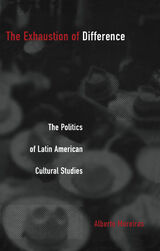
What, asks Moreiras, is the function of critical reason in the present moment? What is regionalistic knowledge in the face of globalization? Can regionalistic knowledge be an effective tool for a critique of contemporary reason? What is the specificity of Latin Americanist reflection and how is it situated to deal with these questions? Through examinations of critical regionalism, restitutional excess, the historical genealogy of Latin American subalternism, testimonio literature, and the cultural politics of magical realism, Moreiras argues that while cultural studies is increasingly institutionalized and in danger of reproducing the dominant ideologies of late capitalism, it is also ripe for giving way to projects of theoretical reformulation. Ultimately, he claims, critical reason must abandon its allegiance to aesthetic-historicist projects and the destructive binaries upon which all cultural theories of modernity have been constructed.
The Exhaustion of Difference makes a significant contribution to the rethinking of Latin American cultural studies.
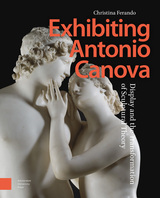

Today, nearly any group or nation with violence in its past has constructed or is planning a memorial museum as a mechanism for confronting past trauma, often together with truth commissions, trials, and/or other symbolic or material reparations. Exhibiting Atrocity documents the emergence of the memorial museum as a new cultural form of commemoration, and analyzes its use in efforts to come to terms with past political violence and to promote democracy and human rights.
Through a global comparative approach, Amy Sodaro uses in-depth case studies of five exemplary memorial museums that commemorate a range of violent pasts and allow for a chronological and global examination of the trend: the U.S. Holocaust Memorial Museum in Washington, DC; the House of Terror in Budapest, Hungary; the Kigali Genocide Memorial Centre in Rwanda; the Museum of Memory and Human Rights in Santiago, Chile; and the National September 11 Memorial Museum in New York. Together, these case studies illustrate the historical emergence and global spread of the memorial museum and show how this new cultural form of commemoration is intended to be used in contemporary societies around the world.
Download open access ebook.
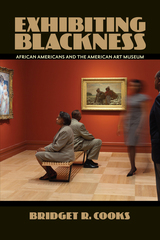
In Exhibiting Blackness, art historian Bridget R. Cooks analyzes the curatorial strategies, challenges, and critical receptions of the most significant museum exhibitions of African American art. Tracing two dominant methodologies used to exhibit art by African Americans—an ethnographic approach that focuses more on artists than their art, and a recovery narrative aimed at correcting past omissions—Cooks exposes the issues involved in exhibiting cultural difference that continue to challenge art history, historiography, and American museum exhibition practices. By further examining the unequal and often contested relationship between African American artists, curators, and visitors, she provides insight into the complex role of art museums and their accountability to the cultures they represent.
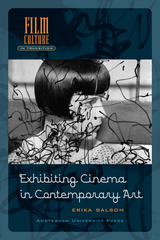

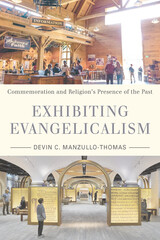
Religion is a subject often overlooked or ignored by public historians. Whether they are worried about inadvertent proselytizing or fearful of contributing to America’s ongoing culture wars, many heritage professionals steer clear of discussing religion’s formative role in the past when they build collections, mount exhibits, and develop educational programming. Yet religious communities have long been active contributors to the nation’s commemorative landscape.
Exhibiting Evangelicalism provides the first account of the growth and development of historical museums created by white evangelical Christians in the United States over the twentieth and twenty-first centuries. Exploring the histories of the Museum of the Bible, the Billy Graham Center Museum, the Billy Sunday Home, and Park Street Church, Devin C. Manzullo-Thomas illustrates how these sites enabled religious leaders to develop a coherent identity for their fractious religious movement and to claim the centrality of evangelicalism to American history. In their zeal to craft a particular vision of the national past, evangelicals engaged with a variety of public history practices and techniques that made them major players in the field—including becoming early adopters of public history’s experiential turn.
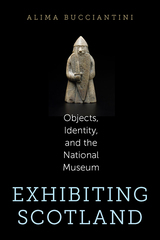
In Exhibiting Scotland, Alima Bucciantini traces how these collections have helped tell the changing stories of this country for centuries and how the museum reflects the Scots' continuing negotiation of their place within modern Britain.


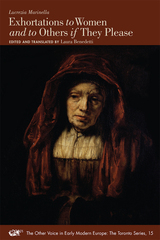
—Maria Galli Stampino
Associate Professor of French and Italian
University of Miami

Bronka Schneider and her husband, Joseph, were two of the thirty thousand Austrian Jews admitted as refugees to Great Britain between March 1938 and 2 September 1939. It was not until 1960, however, that Schneider wrote her memoir about the year she spent as a housekeeper, with Joseph as a butler, in a Scottish castle.
Schneider tells of daily encounters—with her employers, the English lady and her husband, a retired British civil servant who had spent many years in India; the village locals; other refugees; and a family of evacuees from the slums of Glasgow.
The editors have divided this memoir into chapters, adding headlines from the London Times as epigraphs. These headlines, reporting the escalating events of World War II, are in stark contrast to daily activities of the residents of this isolated region of Scotland. A commentary by Erika Bourguignon provides historical, political, and cultural background of this period.
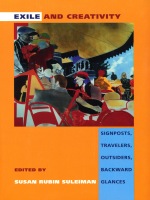
In essays that range chronologically from the Renaissance to the 1990s, geographically from the Danube to the Andes, and historically from the Inquisition to the Holocaust, the complexities and tensions of exile and the diversity of its experiences are examined. Recognizing exile as an interior experience as much as a physical displacement, this collection discusses such varied topics as intellectual exile and seventeenth-century French literature; different versions of home and of the novel in the writings of Bakhtin and Lukács; the displacement of James Joyce and Clarice Lispector; a young journalist’s meeting with James Baldwin in the south of France; Jean Renoir’s Hollywood years; and reflections by the descendents of European emigrés. Strikingly, many of the essays are themselves the work of exiles, bearing out once more the power of the personal voice in scholarship.
With the exception of the contribution by Henry Louis Gates Jr., these essays were originally published in a special double issue of Poetics Today in 1996. Exile and Creativity will engage a range of readers from those whose specific interests include the problems of displacement and diaspora and the European Holocaust to those whose broad interests include art, literary and cultural studies, history, film, and the nature of human creativity.
Contributors. Zygmunt Bauman, Janet Bergstrom, Christine Brooke-Rose, Hélène Cixous, Tibor Dessewffy, Marianne Hirsch, Denis Hollier, Henry Louis Gates Jr., Linda Nochlin, Leo Spitzer, Susan Rubin Suleiman, Thomas Pavel, Doris Sommer, Nancy Huston, John Neubauer, Ernst van Alphen, Alicia Borinsky, Svetlana Boym, Jacqueline Chénieux-Gendron
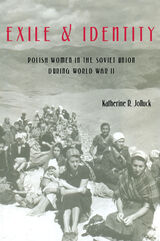
Upon arrival in remote areas of the Soviet Union, they were deposited in prisons, labor camps, special settlements, and collective farms, and subjected to tremendous hardships and oppressive conditions. In 1942, some 115,000 Polish citizens—only a portion of those initially exiled from their homeland—were evacuated to Iran. There they were asked to complete extensive questionnaires about their experiences.
Having read and reviewed hundreds of these documents, Jolluck reveals not only the harsh treatment these women experienced, but also how they maintained their identities as respectable women and patriotic Poles. She finds that for those exiled, the ways in which they strove to recreate home in a foreign and hostile environment became a key means of their survival.
Both a harrowing account of brutality and suffering and a clear analysis of civilian experiences in wartime, Exile and Identity expands the history of war far beyond the military battlefield.
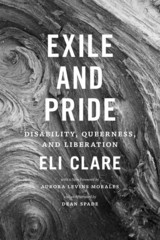
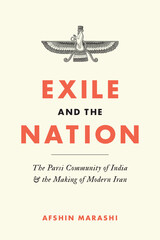
Honorable Mention, Hamid Naficy Iranian Studies Book Award from the Association of Iranian Studies
In the aftermath of the seventh-century Islamic conquest of Iran, Zoroastrians departed for India. Known as the Parsis, they slowly lost contact with their ancestral land until the nineteenth century, when steam-powered sea travel, the increased circulation of Zoroastrian-themed books, and the philanthropic efforts of Parsi benefactors sparked a new era of interaction between the two groups.Tracing the cultural and intellectual exchange between Iranian nationalists and the Parsi community during the late nineteenth and early twentieth centuries, Exile and the Nation shows how this interchange led to the collective reimagining of Parsi and Iranian national identity—and the influence of antiquity on modern Iranian nationalism, which previously rested solely on European forms of thought. Iranian nationalism, Afshin Marashi argues, was also the byproduct of the complex history resulting from the demise of the early modern Persianate cultural system, as well as one of the many cultural heterodoxies produced within the Indian Ocean world. Crossing the boundaries of numerous fields of study, this book reframes Iranian nationalism within the context of the connected, transnational, and global history of the modern era.
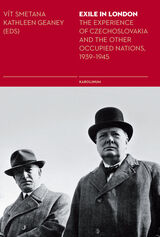

At midcentury, two distinct Polish immigrant groups—those Polish Americans who were descendants of economic immigrants from the turn of the twentieth century and the Polish political refugees who chose exile after World War II and the communist takeover in Poland—faced an uneasy challenge to reconcile their concepts of responsibility toward the homeland.
The new arrivals did not consider themselves simply as immigrants, but rather as members of the special category of political refugees. They defined their identity within the framework of the exile mission, an unwritten set of beliefs, goals, and responsibilities, placing patriotic work for Poland at the center of Polish immigrant duties.
In The Exile Mission, an intriguing look at the interplay between the established Polish community and the refugee community, Anna Jaroszyńska–Kirchmann presents a tale of Polish Americans and Polish refugees who, like postwar Polish exile communities all over the world, worked out their own ways to implement the mission’s main goals. Between the outbreak of World War II and 1956, as Professor Jaroszyńska–Kirchmann demonstrates, the exile mission in its most intense form remained at the core of relationships between these two groups.
The Exile Mission is a compelling analysis of the vigorous debate about ethnic identity and immigrant responsibility toward the homeland. It is the first full–length examination of the construction and impact of the exile mission on the interactions between political refugees and established ethnic communities.

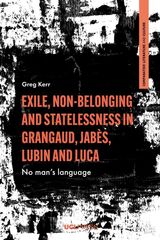
Poetry has often been understood as a powerful vector of collective belonging. The idea that certain poets are emblematic of a national culture is one of the chief means by which literature historicizes itself, inscribes itself in a shared cultural past, and supplies modes of belonging to those who consume it. But, how does the exiled, migrant, or translingual poet complicate this narrative? For Armen Lubin, Ghérasim Luca, Edmond Jabès, and Michelle Grangaud, the practice of poetry is inseparable from a sense of restlessness or unease. Ranging across borders within and beyond the Francosphere—from Algeria, Armenia, Egypt, and Romania—this book shows how a poetic practice inflected by exile, statelessness, or non-belonging has the potential to disrupt long-held assumptions about the relation between subjects, the language they use, and the place from which they speak.

Brian Aldiss is one of the great figures in science fiction. Classics in the genre, his books serve as portals to other worlds, captivating readers with strange and shocking narratives that have been a force for further experimentation within the genre. In addition to a highly successful career as a writer of both fiction and science fiction, Aldiss is also an accomplished artist and literary critic.
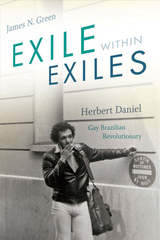

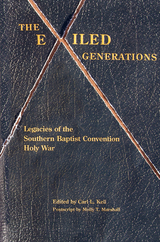
Until now, the stories of this “lost generation” have never been fully told. In this collection, Professor Kell presents a diverse and wide range of voices. Some are well-known Baptist leaders, while others are ordinary people caught up in the remarkable changes in Baptist life over the past few decades. Here, they recount their feelings of loss as they were severed from youth fellowships and removed from church rolls. Many describe the lingering emotional effects of the heartbreaking conflict that dominated their childhood and adolescence. Their recollections reveal the full range of responses—anger, sadness, pathos, humor, intense inner reflection—to these enormous shifts. This volume shows the extent to which this group has struggled and wandered in emotional and religious exile.
The Exiled Generations comprises rich primary sources for scholars and students who are exploring the profound strife that has rocked the Southern Baptist Convention. These deeply moving accounts will offer invaluable assistance to researchers analyzing the impact of the seismic changes within the denomination over the past thirty-five years.
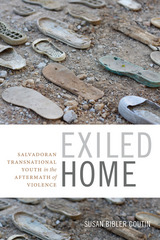
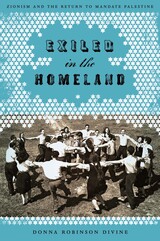
Offering a new perspective on Zionism, Exiled in the Homeland draws on memoirs, newspaper accounts, and archival material to examine closely the lives of the men and women who immigrated to Palestine in the early twentieth century. Rather than reducing these historic settlements to a single, unified theme, Donna Robinson Divine's research reveals an extraordinary spectrum of motivations and experiences among these populations.
Though British rule and the yearning for a Jewish national home contributed to a foundation of solidarity, Exiled in the Homeland presents the many ways in which the message of emigration settled into the consciousness of the settlers. Considering the benefits and costs of their Zionist commitments, Divine explores a variety of motivations and outcomes, ranging from those newly arrived immigrants who harnessed their ambition for the goal of radical transformation to those who simply dreamed of living a better life. Also capturing the day-to-day experiences in families that faced scarce resources, as well as the British policies that shaped a variety of personal decisions on the part of the newcomers, Exiled in the Homeland provides new keys to understanding this pivotal chapter in Jewish history.
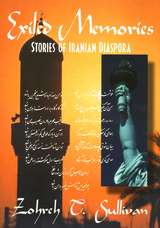
These are the words of one Iranian emigre, driven from Tehran by the revolution of 1979. They are echoed time and again in this powerful portrayal of loss and survival. Impelled by these word and her own concerns about nationality and identity, Zohreh Sullivan has gathered together here the voices of sixty exiles and emigres. The speakers come from various ethnic and religious backgrounds and range in age from thirteen to eighty-eight. Although most are from the middle class, they work in a variety of occupations in the United States. But whatever their differences, here they engage in remembering the past, producing a discourse about their lives, and negotiating the troubled transitions from one culture to another.
Unlike man other Iranian oral history projects, Exiled Memories looks at the reconstruction of memory and identity through diasporic narratives, through a focus on the Americas rather than on Iran. The narratives included here reveal the complex ways in which events and places transform identities, how overnight radical s become conservatives, friends become enemies, the strong become weak. Indeed, the narratives themselves serve this function -- serving to transfer or transform power and establish credibility. They reveal a diverse group of people in the process of knitting the story of themselves with the story of the collective after it has been torn apart.
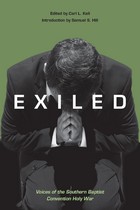
tactics to gain top positions and then used their power to purge Baptist seminary presidents and professors, church pastors, lay leaders, and women from positions of responsibility. America's largest Christian, non-Catholic denomination is firmly locked in a “holy war” to secure its churches and membership for a never-ending struggle against a liberal culture.
Exiled: Voices of the Southern Baptist Convention Holy War is a compilation of first-person narratives by conservative and moderate ministers and lay leaders who were stripped of their positions and essentially became pariahs in the churches to which they had devoted their lives.
While other books have described the takeover in historical, political, and theological terms, Exiled is different. Individual people tell their personal stories, revealing the struggle and heartache that resulted from being vilified, dispossessed, and exiled. Kell includes a variety of perspectives-from lay preachers and church members to prominent former SBC leaders such as James Dunn and Carolyn Crumpler.
The emotion captured on the pages-sadness, shock, disbelief, resignation,
and anger-will make Exiled moving even to readers who know little about the Southern Baptist movement. Exiled will also be of particular interest to historians, sociologists, philosophers of religion, and rhetorical historians.
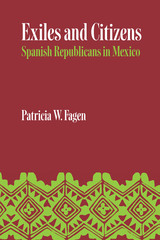
At the end of the Spanish civil war, Mexico was the only country to offer open refuge to the thousands of Republican emigrés who fled from Spain in 1939–1940. Exiles and Citizens is a study of these political exiles, especially those with intellectual and professional backgrounds and ambitions. It focuses on their adjustment to Mexico, on their continued ties to Spain, and on their impact on Mexican development.
The critical dilemma faced by the Spanish exiles was that, despite having fought for their political and social ideals in Spain, they forfeited in exile their active role in Spanish history. In Mexico they found a political and social system that seemed to include many of the ideals that had inspired the Spanish Republic; moreover, they were able to incorporate themselves economically, professionally, and intellectually into Mexican national life. Yet, because they were not native-born citizens, they had little or no creative part to play in the politics of their adopted country.
For Mexico, the impact of the refugees from Spain was enormous. Integrated from the first into nearly all intellectual, professional, and cultural fields, their skills proved an important catalyst to Mexican development. Yet, outside these fields, Mexico was never an effective "melting pot." The Republicans themselves were divided in their loyalties, and the Mexicans, from the beginning, were reluctant to encourage the full participation of their guests in national affairs.
Two goals were shared by most of the exiles: to ensure that the world would remember the liberal, creative, and open Spain they had created and thus reject Franco; to show their gratitude by working for the benefit and progress of Mexico. These goals, although frequently contradictory, sustained the emigration and gave meaning to exile. The refugees tried to maintain their identity by coming together in formal and informal associations that were intended either to act on behalf of the homeland or to re-create the Spanish Republican structures and values in exile. To maintain a Spanish identity, however, proved difficult, and for the second and third generations in Mexico, the initial goals had already lost their meaning. For them, economic and professional, as well as familial, ties were strongly Mexican.
Spanish Republicans in Mexico represented a fairly rare phenomenon: a large group of skilled, relatively well educated immigrants to a country where persons of their attainments and status were not numerous. Moreover, as political exiles, they approached the problems of acculturation differently from economic emigrants. Patricia Fagen's study thus offers a further understanding of an important exile community and the characteristics that set it apart from other examples of immigrant experiences. In addition, the study sheds new light on the intellectual history of Mexico and the far-reaching effects of the Spanish civil war.

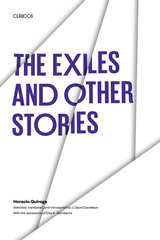
Tales of risk and danger, suffering, disease, horror, and death. Tales, also, of courage and dignity, hard work, and human endurance in the face of hostile nature and the frequent brutality of men. And tales flavored with piquant touches of humor and bemused irony.
These are the stories of the Uruguayan writer Horacio Quiroga, here presented in an important compilation of thirteen of his most compelling tales, sensitively selected and translated by J. David Danielson. Author of some two hundred pieces of fiction, often compared to the works of Kipling, Jack London, and Edgar Allan Poe, Quiroga set many of his stories in the territory of Misiones in northeastern Argentina, the subtropical jungle region where he spent much of his life.
Included here are stories from Los desterrados (1926) often said to be his best book, as well as others from Cuentos de amor de locura y de muerte (1917), Anaconda (1921), and El Desierto (1924). The publication of this selection marks the first appearance in English of all but two of the thirteen stories.
Quiroga here presents a wide range of characters: parents and children, servant girls and prostitutes, landowners and lumber barons, foremen and laborers, natives and immigrants, in stories pervaded by a vision of life that is elemental, incisive, and essentially tragic. The Exiles and Other Stories shows the versatility and skill that have made him a classic Spanish American writer. It complements and illumines The Decapitated Chicken and Other Stories, selected and translated by Margaret Sayers Peden, also published by the University of Texas Press.

New Orleans has always captured our imagination as an exotic city in its racial ambiguity and pursuit of les bons temps. Despite its image as a place apart, the city played a key role in nineteenth-century America as a site for immigration and pluralism, the quest for equality, and the centrality of self-making.
In both the literary imagination and the law, creoles of color navigated life on a shifting color line. As they passed among various racial categories and through different social spaces, they filtered for a national audience the meaning of the French Revolution, the Haitian Revolution of 1804, the Civil War and Reconstruction, and de jure segregation.
Shirley Thompson offers a moving study of a world defined by racial and cultural double consciousness. In tracing the experiences of creoles of color, she illuminates the role ordinary Americans played in shaping an understanding of identity and belonging.
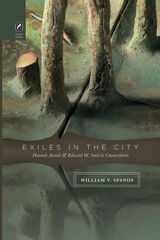
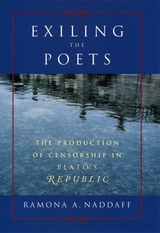
Censorship, Nadaff argues, is not merely a mechanism of silencing but also provokes new ways of speaking about controversial and crucial cultural and artistic events. It functions philosophically in the Republic to subvert Plato's most crucial arguments about politics, epistemology, metaphysics, and ethics. Naddaff develops this stunning argument through an extraordinary reading of Plato's work. In books 2 and 3, the first censorship of poetry, she finds that Plato constitutes the poet as a rival with whom the philosopher must vie agonistically. In other words, philosophy does not replace poetry, as most commentators have suggested; rather, the philosopher becomes a worthy and ultimately victorious poetic competitor. In book 10's second censorship, Plato exiles the poets as a mode of self-subversion, rethinking and revising his theory of mimesis, of the immortality of the soul, and, most important, the first censorship of poetry. Finally, in a subtle and sophisticated analysis of the myth of Er, Naddaff explains how Plato himself censors his own censorships of poetry, thus producing the unexpected result of a poetically animated and open-ended dialectical philosophy.

In the turmoil of the 1920s and ’30s, Claude Cahun challenged gender stereotypes with her powerful photographs, montages, and writings, works that appear to our twenty-first-century eyes as utterly contemporary, or even from the future. She wrote poetry and prose for major French literary magazines, worked in avant-garde theater, and was both comrade of and critical outsider to the Surrealists. Exist Otherwise is the first work in English to the tell the full story of Claude Cahun’s art and life, one that celebrates and makes accessible Cahun’s remarkable vision.
Jennifer L. Shaw embeds Cahun within the exciting social and artistic milieu of Paris between the wars. She examines her relationship with Marcel Moore—Cahun’s stepsister, lover, and life partner—who was a central collaborator helping make some of the most compelling photographs and photomontages of Cahun’s oeuvre, dreamscapes of disassembled portraiture and scenes that simultaneously fascinate and terrify. Shaw follows Cahun into the horrors of World War II and the Nazi occupation of the island of Jersey off the coast of Normandy, and she explores the powerful and dangerous ways Cahun resisted it. Reading through her letters and diaries, Shaw brings Cahun’s ideas and feelings to the foreground, offering an intimate look at how she thought about photography, surrealism, the histories of women artists, and queer culture.


Arguing that the mind is essentially embedded in the external world, Ron McClamrock provides a schema that allows cognitive scientists to address such long-standing problems in artificial intelligence as the "frame" problem and the issue of "bounded" rationality. Extending this schema to cover progress in other studies of behavior, including language, vision, and action, McClamrock reinterprets the importance of the organism/environment distinction. McClamrock also considers the broader philosophical question of the place of mind in the world, particularly with regard to questions of intentionality, subjectivity, and phenomenology.
With implications for philosophy, cognitive and computer science, AI, and psychology, this book synthesizes state-of-the-art work in philosophy and cognitive science on how the mind interacts with the world to produce thoughts, ideas, and actions.
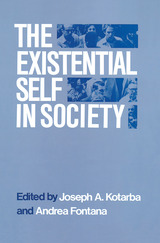
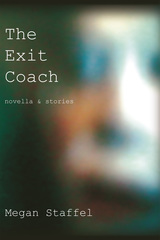

Known as the Garden State, New Jersey could also be called the Fishing State. New Jersey boasts more than 6,000 miles of rivers and streams; 24,000 acres of public lakes, reservoirs and ponds; 420 square miles of open bay and estuary waters; and 120 miles of ocean coast — with nearly every gallon of water swimming with a remarkable variety of fish.
Using his more than 50 years of personal and academic observations, Glenn R. Piehler has written the perfect guidebook for new and proficient anglers, as well as students of fisheries science.
Piehler begins with the taxonomic origins and classification of almost 100 species of fresh and saltwater sport fishes described in the book, as well as “a number of creatures you might unwittingly hook into . . . with just enough technical jargon and information on the general biology of fishes to make the remaining chapters more winning,” he writes. “In each case I have tried to capture the essence of each species or group of species—what they look like, how big they get, where they came from, what kind of waterbodies they live in, what they do for a living, generally how and when they may be caught, how they’ve fared over the years and are doing today, and where you can get more specific information about some of them.”
Exit Here for Fish examines the factors affecting the distribution and abundance of fish, probing the controversies surrounding preservation efforts, and the apportionment of fish among sport and commercial interests. Piehler looks at the seldom-examined history of fisheries and laws dealing with their management, habitats, and water quality. Finally, he lists a host of activities readers can enjoy, such as fish tagging and volunteering for the Wildlife Conservation Corps, to help preserve and protect the fun of fishing.
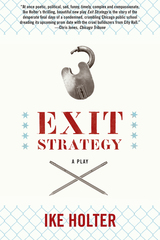
Drawing from the headlines, Exit Strategy is set in Chicago and tells the story of a fictional public high school slated for closure at the end of the year. Despite funding cuts, bureaucrats run amok, apathy, and a rodent infestation, a small, multiracial group of teachers launch a last-minute effort to save the school, and put their careers, futures, and safety in the hands of a fast-talking administrator who may be in over his head. The tenuous situation also raises fears and anxieties among students, and within the volcanic neighborhood that is home to the school.
Holter has said that Exit Strategy was inspired by the 2013 mass closure of forty-nine Chicago public schools, which displaced nearly 12,000 children—the majority of directly impacted students were African American and Latinx. Hailed as "riveting," "sharp," and "richly metaphoric" by critics, the play indicts how we educate our children in big American cities, and shows why gaps between haves and have-nots continue to grow.
Exit Strategy is one of seven plays in Ike Holter's cycle of works set in Chicago or Chicago-inspired neighborhoods.

Winner of the 2016 Colorado Prize for Poetry
Selected by Tyrone Williams for the 2016 Colorado Prize for Poetry, Exit Theater casts classical elegy, with dazzling formal innovation, into a staggering work of contemporary, political polyphony. Through monologues, performance scripts, and poems of exquisite prosody, Mike Lala examines the human figure—as subject and object, enemy and ally—in the context of a progressively defigured and hostile world. Catullus, Shakespeare, Cy Twombly, and Lydia Delectorskaya echo across engagements with Israeli generals, accused terrorists, State Department employees, nuclear scientists, Saturday Night Live actors, war criminals, malware, and a host of mythic, literary, and half-extant spectral characters. Amid the cacophony, Lala implicates every actor, including himself, in a web of shared culpability vis-à-vis consumerism, representation, speaking, writing, and making art against the backdrop of the endless, open wars of a post–Cold War, post-2001 era. Exit Theater is a debut of and against its time—a book about war, art, and what it means to make art in a time of war.
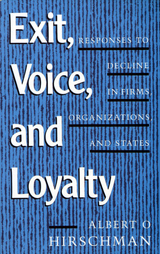
An innovator in contemporary thought on economic and political development looks here at decline rather than growth. Albert O. Hirschman makes a basic distinction between alternative ways of reacting to deterioration in business firms and, in general, to dissatisfaction with organizations: one, “exit,” is for the member to quit the organization or for the customer to switch to the competing product, and the other, “voice,” is for members or customers to agitate and exert influence for change “from within.” The efficiency of the competitive mechanism, with its total reliance on exit, is questioned for certain important situations. As exit often undercuts voice while being unable to counteract decline, loyalty is seen in the function of retarding exit and of permitting voice to play its proper role.
The interplay of the three concepts turns out to illuminate a wide range of economic, social, and political phenomena. As the author states in the preface, “having found my own unifying way of looking at issues as diverse as competition and the two-party system, divorce and the American character, black power and the failure of ‘unhappy’ top officials to resign over Vietnam, I decided to let myself go a little.”

In 1980, Christine J. Walley’s world was turned upside down when the steel mill in Southeast Chicago where her father worked abruptly closed. In the ensuing years, ninety thousand other area residents would also lose their jobs in the mills—just one example of the vast scale of deindustrialization occurring across the United States. The disruption of this event propelled Walley into a career as a cultural anthropologist, and now, in Exit Zero, she brings her anthropological perspective home, examining the fate of her family and that of blue-collar America at large.
This book is part of a project that also includes a documentary film.
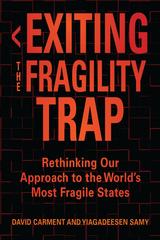
State fragility is a much-debated yet underinvestigated concept in the development and international security worlds. Based on years of research as part of the Country Indicators for Foreign Policy project at Carleton University, Exiting the Fragility Trap marks a major step toward remedying the lack of research into the so-called fragility trap. In examining the nature and dynamics of state transitions in fragile contexts, with a special emphasis on states that are trapped in fragility, David Carment and Yiagadeesen Samy ask three questions: Why do some states remain stuck in a fragility trap? What lessons can we learn from those states that have successfully transitioned from fragility to stability and resilience? And how can third-party interventions support fragile state transitions toward resilience?
Carment and Samy consider fragility’s evolution in three state types: countries that are trapped, countries that move in and out of fragility, and countries that have exited fragility. Large-sample empirical analysis and six comparative case studies—Pakistan and Yemen (trapped countries), Mali and Laos (in-and-out countries), and Bangladesh and Mozambique (exited countries)—drive their investigation, which breaks ground toward a new understanding of why some countries fail to see sustained progress over time.
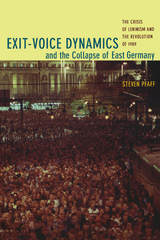
East Germany was the first domino to fall when the Soviet bloc began to collapse in 1989. Its topple was so swift and unusual that it caught many area specialists and social scientists off guard; they failed to recognize the instability of the Communist regime, much less its fatal vulnerability to popular revolt. In this volume, Steven Pfaff identifies the central mechanisms that propelled the extraordinary and surprisingly bloodless revolution within the German Democratic Republic (GDR). By developing a theory of how exit-voice dynamics affect collective action, Pfaff illuminates the processes that spurred mass demonstrations in the GDR, led to a peaceful surrender of power by the hard-line Leninist elite, and hastened German reunification. While most social scientific explanations of collective action posit that the option for citizens to emigrate—or exit—suppresses the organized voice of collective public protest by providing a lower-cost alternative to resistance, Pfaff argues that a different dynamic unfolded in East Germany. The mass exit of many citizens provided a focal point for protesters, igniting the insurgent voice of the revolution.
Pfaff mines state and party records, police reports, samizdat, Church documents, and dissident manifestoes for his in-depth analysis not only of the genesis of local protest but also of the broader patterns of exit and voice across the entire GDR. Throughout his inquiry, Pfaff compares the East German rebellion with events occurring during the same period in other communist states, particularly Czechoslovakia, China, Poland, and Hungary. He suggests that a trigger from outside the political system—such as exit—is necessary to initiate popular mobilization against regimes with tightly centralized power and coercive surveillance.
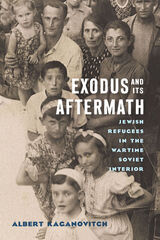
Albert Kaganovitch reconstructs the conditions that gave rise to this upsurge in antisemitic sentiment and provides new statistical data on the number of Jewish refugees who lived in the Urals, Siberia, and Middle Volga areas. The book’s insights into the regional distribution and concentration of these émigrés offer a behind-the-scenes look at the largest and most intensive Jewish migration in history.
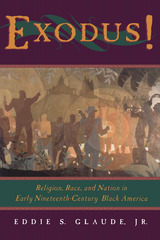
Exodus! shows how this biblical story inspired a pragmatic tradition of racial advocacy among African Americans in the early nineteenth century—a tradition based not on race but on a moral politics of respectability. Eddie S. Glaude, Jr., begins by comparing the historical uses of Exodus by black and white Americans and the concepts of "nation" it generated. He then traces the roles that Exodus played in the National Negro Convention movement, from its first meeting in 1830 to 1843, when the convention decided—by one vote—against supporting Henry Highland Garnet's call for slave insurrection.
Exodus! reveals the deep historical roots of debates over African-American national identity that continue to rage today. It will engage anyone interested in the story of black nationalism and the promise of African-American religious culture.

Exoplanets serves as both an introduction for the non-specialist and a foundation for the techniques and equations used in exoplanet observation by those dedicated to the field.

“How do alien, faraway worlds reveal their existence to Earthlings? Let Donald Goldsmith count the ways. As an experienced astronomer and a gifted storyteller, he is the perfect person to chronicle the ongoing hunt for planets of other stars.” —Dava Sobel
Astronomers have recently discovered thousands of planets that orbit stars throughout our Milky Way galaxy. With his characteristic wit and style, Donald Goldsmith presents the science of exoplanets and the search for extraterrestrial life in a way that Earthlings with little background in astronomy or astrophysics can understand and enjoy.
Much of what has captured the imagination of planetary scientists and the public is the unexpected strangeness of these distant worlds, which bear little resemblance to the planets in our solar system. The sizes, masses, and orbits of exoplanets detected so far raise new questions about how planets form and evolve. Still more tantalizing are the efforts to determine which exoplanets might support life. Astronomers are steadily improving their means of examining these planets’ atmospheres and surfaces, with the help of advanced spacecraft sent into orbits a million miles from Earth. These instruments will provide better observations of planetary systems in orbit around the dim red stars that throng the Milky Way. Previously spurned as too faint to support life, these cool stars turn out to possess myriad planets nestled close enough to maintain Earthlike temperatures.
The quest to find other worlds brims with possibility. Exoplanets shows how astronomers have broadened our planetary horizons, and suggests what may come next, including the ultimate discovery: life beyond our home planet.
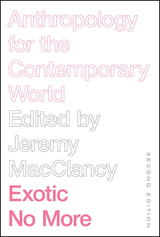
Contributors:Ruben Andersson, Philippe Bourgois, Catherine Buerger, James G. Carrier, Marcus Colchester, James Fairhead, Kim Fortun, Mike Fortun, Katy Gardner, Faye Ginsburg, Roberto J. González, Tom Griffiths, Chris Hann, Susan Harding, Faye V. Harrison, Laurie Kain Hart, Richard Jenkins, George Karandinos, Christopher M. Kelty, Melissa Leach, Margaret Lock, Jeremy MacClancy, Sally Engle Merry, Fernando Montero, Matt Sakakeeny, Anthony Alan Shelton, Christopher B. Steiner, Richard Ashby Wilson
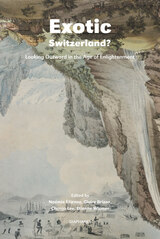

Contributors. Geraldine Barnes, Alexandra Cook, David Culpin, John Greene, Suzanne Kiernan, Christa Knellwolf, Adrian Mitchell, Lisa O’Connell, David Paxman, Ali Uzay Peker, Glynis Ridley, Nicholas Rogers, Walter Veit
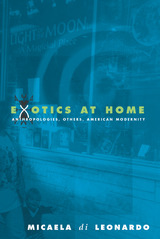
"An impressive work of scholarship that is mordantly witty, passionately argued, and takes no prisoners."—Lesley Gill, News Politics
"[Micaela] di Leonardo eloquently argues for the importance of empirical, interdisciplinary social science in addressing the tragedy that is urban America at the end of the century."—Jonathan Spencer, Times Literary Supplement
"In her quirky new contribution to the American culture brawl, feminist anthropologist Micaela di Leonardo explains how anthropologists, 'technicians of the sacred,' have distorted American popular debate and social life."—Rachel Mattson, Voice Literary Supplement
"At the end of di Leonardo's analyses one is struck by her rare combination of rigor and passion. Simply, [she] is a marvelous iconoclast."—Matthew T. McGuire, Boston Book Review
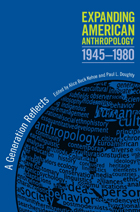

Expanding Class compares Brabant’s quaint central shoemaking district to its electrical boomtown Eindhoven, home of the enormous Philips Corporation. It introduces the concept of "flexible familism," a sociological phenomenon in which family daughters were employed to facilitate a cheap and ample labor force. Industrialists manipulated and fostered flexible familism to ensure the discipline and loyalty of the working-class community. By using the industrial Netherlands as a paradigm, Kalb reveals new and productive ways to examine class construction and the development of labor history in other countries over the past thirty years, steering a path between the two schools of thought—cultural and economic—that have dominated labor history discussions in recent years.
READERS
Browse our collection.
PUBLISHERS
See BiblioVault's publisher services.
STUDENT SERVICES
Files for college accessibility offices.
UChicago Accessibility Resources
home | accessibility | search | about | contact us
BiblioVault ® 2001 - 2024
The University of Chicago Press









